Resources for Online Teaching
> Geostache
Arundhati Roy “The Pandemic is a Portal”
Teaching African American Literature During COVID-19. Experiential Learning in Online Instruction. What is Experiential Learning?
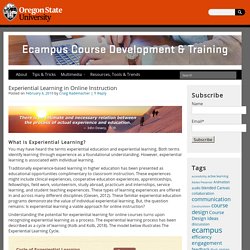
You may have heard the terms experiential education and experiential learning. Both terms identify learning through experience as a foundational understanding. However, experiential learning is associated with individual learning. Traditionally experience-based learning in higher education has been presented as educational opportunities complimentary to classroom instruction. These experiences might include clinical experiences, cooperative education experiences, apprenticeships, fellowships, field work, volunteerism, study abroad, practicum and internships, service learning, and student teaching experiences.
Poorvu Center for Teaching and Learning. Assessment allows both instructor and student to monitor progress towards achieving learning objectives, and can be approached in a variety of ways.
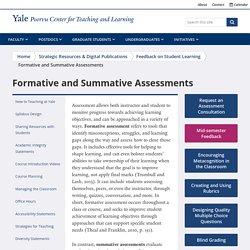
Formative assessment refers to tools that identify misconceptions, struggles, and learning gaps along the way and assess how to close those gaps. It includes effective tools for helping to shape learning, and can even bolster students’ abilities to take ownership of their learning when they understand that the goal is to improve learning, not apply final marks (Trumbull and Lash, 2013). It can include students assessing themselves, peers, or even the instructor, through writing, quizzes, conversation, and more. In short, formative assessment occurs throughout a class or course, and seeks to improve student achievement of learning objectives through approaches that can support specific student needs (Theal and Franklin, 2010, p. 151).
Authentic Assessment: Assessing Student Learning: Teaching Resources: Center for Innovative Teaching and Learning: Indiana University Bloomington. When considering how to assess student learning in a course, most instructors would agree that the ideal assessment would be one that not only assesses students’ learning; it also teaches students and improves their skills and understanding of course content.
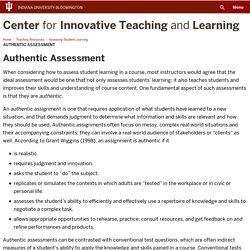
One fundamental aspect of such assessments is that they are authentic. An authentic assignment is one that requires application of what students have learned to a new situation, and that demands judgment to determine what information and skills are relevant and how they should be used. Authentic assignments often focus on messy, complex real-world situations and their accompanying constraints; they can involve a real-world audience of stakeholders or “clients” as well. According to Grant Wiggins (1998), an assignment is authentic if it Authentic assessments can be contrasted with conventional test questions, which are often indirect measures of a student’s ability to apply the knowledge and skills gained in a course. References. Geological Sounds. I love it when scientists speak out about their work in their own voices and their own words.
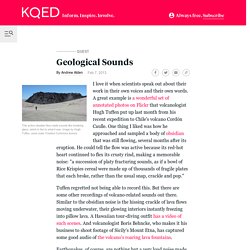
A great example is a wonderful set of annotated photos on Flickr that volcanologist Hugh Tuffen put up last month from his recent expedition to Chile's volcano Cordón Caulle. One thing I liked was how he approached and sampled a body of obsidian that was still flowing, several months after its eruption. He could tell the flow was active because its red-hot heart continued to flex its crusty rind, making a memorable noise: "a succession of platy fracturing sounds, as if a bowl of Rice Krispies cereal were made up of thousands of fragile plates that each broke, rather than the usual snap, crackle and pop.
" Tuffen regretted not being able to record this.
But there are some other recordings of volcano-related sounds out there. Earthquakes, of course, are nothing but a very loud noise made by the Earth, mostly at very low frequencies.
IRIS. Use these links to sign up for notifications What Are Teachable Moments?
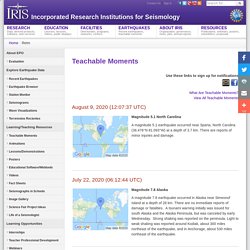
View All Teachable Moments August 9, 2020 (12:07:37 UTC) Magnitude 5.1 North Carolina A magnitude 5.1 earthquake occurred near Sparta, North Carolina (36.476°N 81.093°W) at a depth of 3.7 km. July 22, 2020 (06:12:44 UTC) Magnitude 7.8 Alaska A magnitude 7.8 earthquake occurred in Alaska near Simeonof Island at a depth of 28 km. July 17, 2020 (02:50:23 UTC) Magnitude 7.0 Papua New Guinea A magnitude 7.0 earthquake occurred 194.1 km (120.6 miles) NNE of Port Moresby, National Capital, Papua New Guinea at a depth of 79.8 km (50 miles). June 24, 2020 (17:40:49 UTC) Magnitude 5.8 California A magnitude 5.8 earthquake occurred in the Owens Valley, underneath the bed of Owens Lake, just east of Mt.
Story Spheres - Create Audio Tours of Immersive Imagery. Story Spheres is a free tool for adding audio to 360 degree images that you own or have the rights to re-use (Creative Commons licensed or public domain).
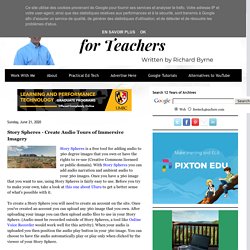
With Story Spheres you can add audio narration and ambient audio to your 360 images. Once you have a 360 image that you want to use, using Story Spheres is fairly easy to use. Before you try to make your own, take a look at this one about Uluru to get a better sense of what's possible with it. To create a Story Sphere you will need to create an account on the site. Once you've created an account you can upload any 360 image that you own. Completed Story Spheres can be shared in all of the usual manners that you might expect including a direct link and embed codes. Applications for Education One of my favorite uses of Story Spheres is creating short local history projects.
Story Spheres. Online Voice Recorder - Record Voice from the Microphone. How Can Educators Tap Into Research to Increase Engagement During Remote Learning?
As university professors and researchers who work closely with K-12 online teachers and learners, we’ve heard from many newly remote educators who are struggling.
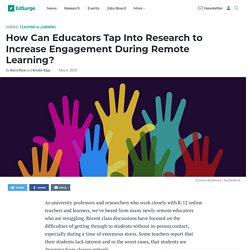
Recent class discussions have focused on the difficulties of getting through to students without in-person contact, especially during a time of enormous stress. Some teachers report that their students lack interest and in the worst cases, that students are dropping from classes entirely. From our experience both in the online classroom and in training teachers to teach online, this is familiar territory and typically happens about six weeks into a new school session. The newness has worn off, the excitement around technology wanes and teachers often struggle finding ways to engage with their students.
5 Traps That Will Kill Online Learning (and Strategies to Avoid Them)
For perhaps the first time in recent memory, parents and teachers may be actively encouraging their children to spend more time on their electronic devices.
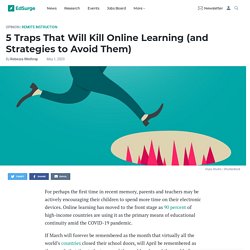
Online learning has moved to the front stage as 90 percent of high-income countries are using it as the primary means of educational continuity amid the COVID-19 pandemic. If March will forever be remembered as the month that virtually all the world’s countries closed their school doors, will April be remembered as the month that the students around the world embraced the world of online learning? There is no shortage of optimistic speculation from education experts and innovators that this experience will have a transformative effect on education after the pandemic is over. I certainly hope this will be true. But what if it is not? There is some evidence that such hope will not materialize, at least if we continue with what we are doing now.
How to Use Your Own VR Tours in Google Expeditions. Virtually Inspired: Showcasing Online Learning Innovation. Whiteboard.fi - Online whiteboard for teachers and classrooms. Best Practices for Teaching Online. Deterring cheating in an online course.








